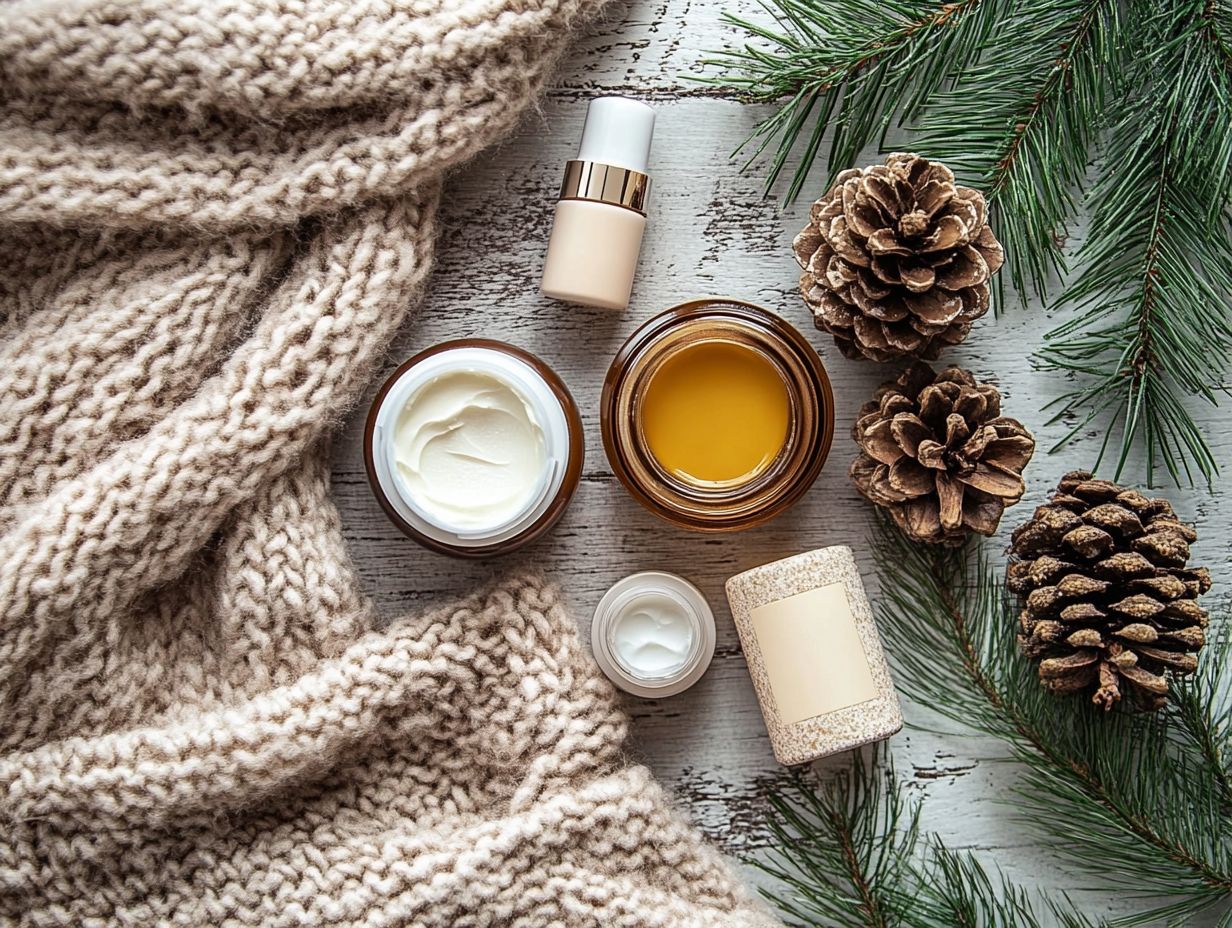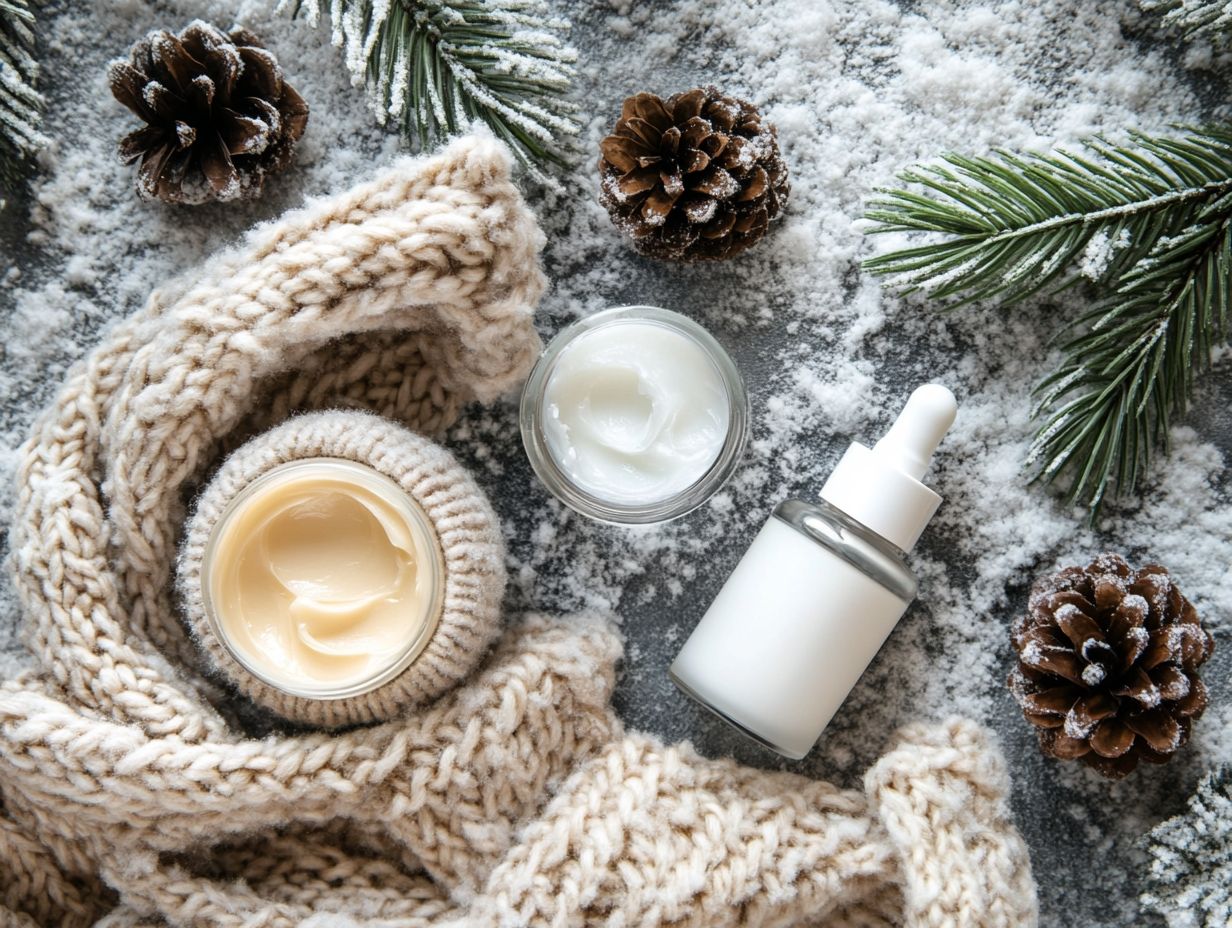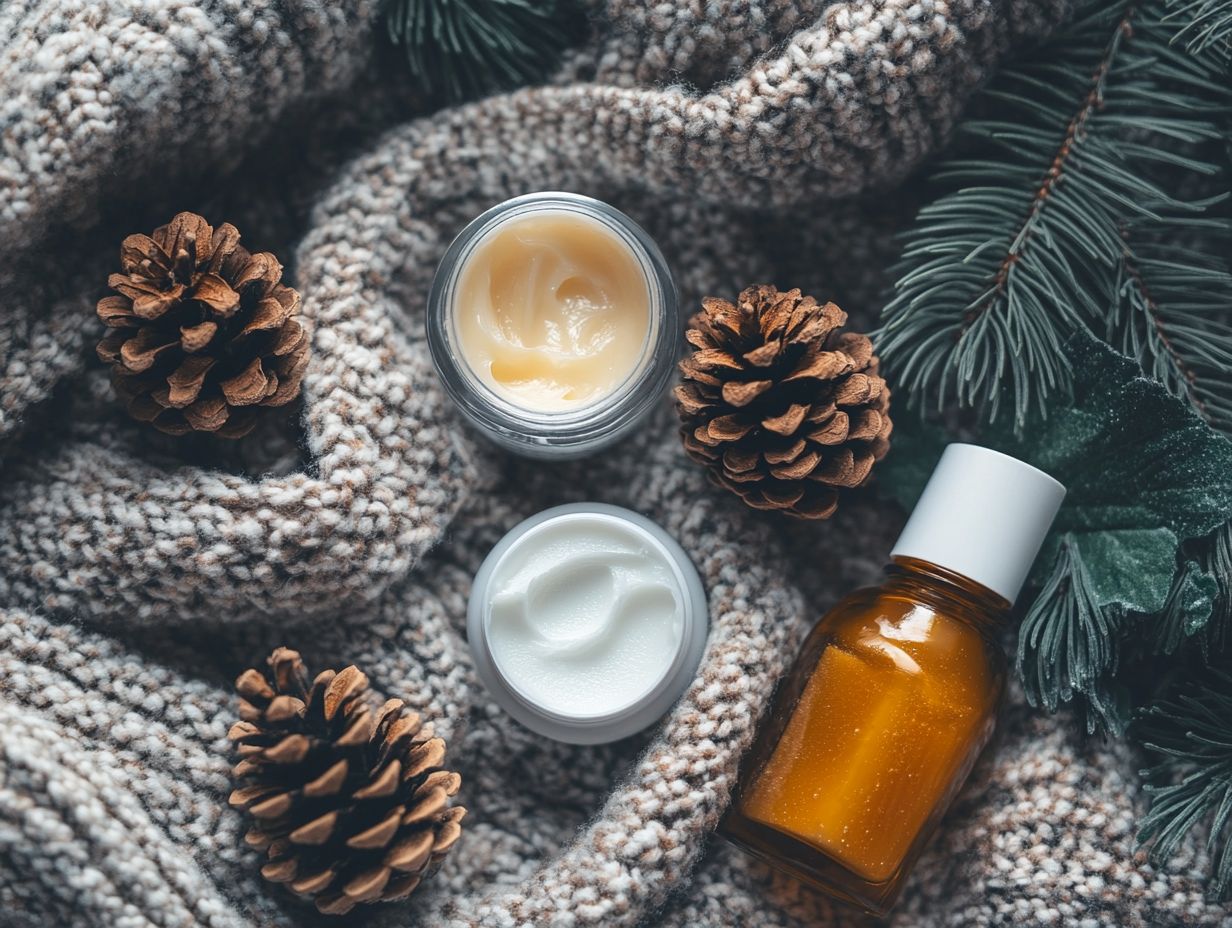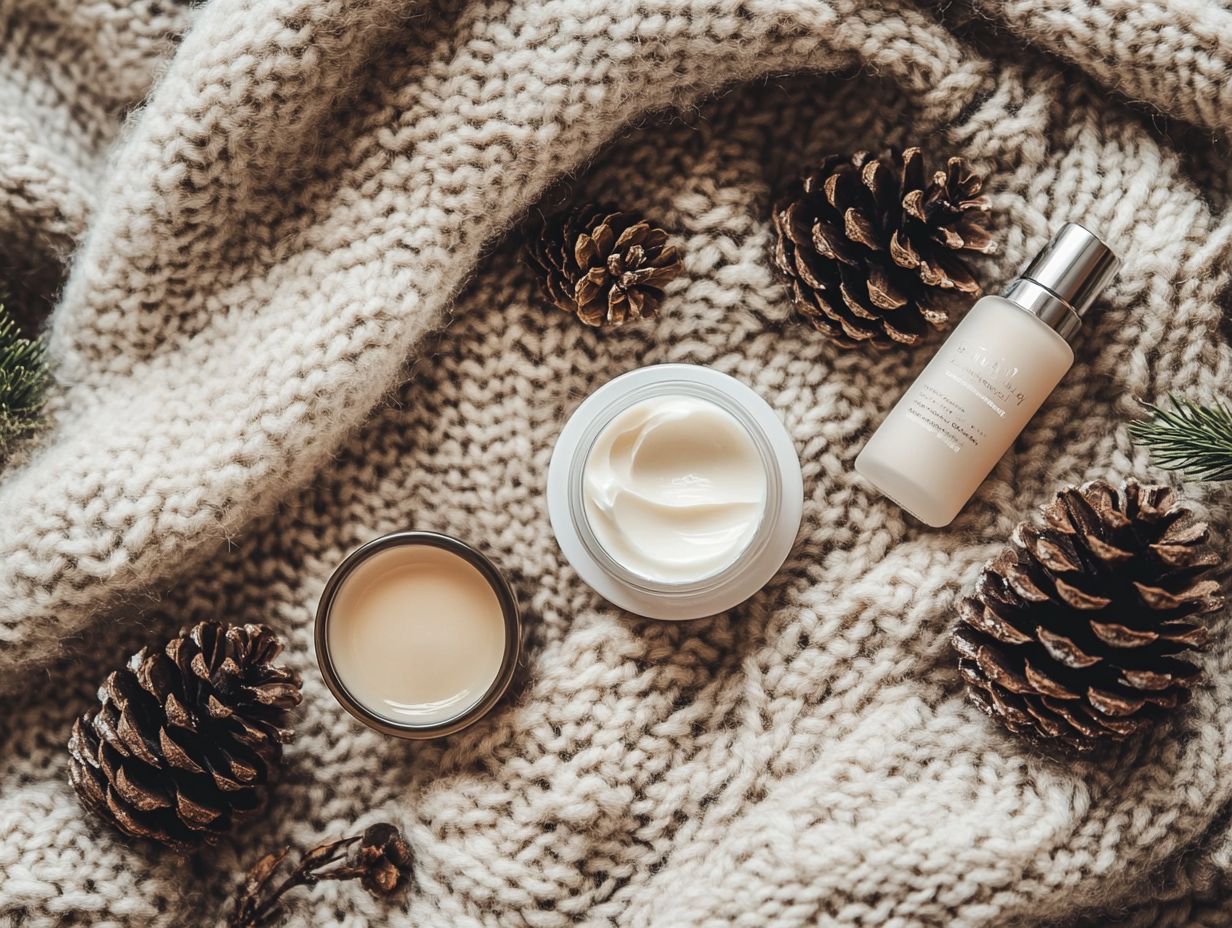As winter settles in, the cold air can wreak havoc on our skin, leaving it dry, flaky, and more susceptible to irritation.
With the right skincare routine, you can protect and nourish your skin throughout the chilly months.
This article explores the specific effects cold weather has on your skin, highlights essential products like moisturizers and sunscreens, and offers practical tips for maintaining a healthy winter skincare regimen.
Get ready to embrace the season with confidence!
Key Takeaways:

The Importance of Skincare in Winter
Winter presents significant challenges for skin health, as cold temperatures and low humidity levels can contribute to dryness and worsen conditions such as eczema and psoriasis.
It is essential to modify one’s skincare routine to ensure optimal hydration and protection during this season. Dermatologists advocate for specific practices and products designed to mitigate the adverse effects of winter weather.
This article will examine the importance of winter skincare, provide guidance on adjusting one’s routine, and outline the best practices recommended by experts to maintain healthy skin despite the harsh winter conditions.
Effects of Cold Weather on Skin
Cold weather significantly impacts the skin, often leading to dryness, irritation, and the exacerbation of pre-existing skin conditions such as eczema and rosacea.
As temperatures decrease, humidity levels typically drop, resulting in the rapid loss of moisture from the skin. This lack of hydration can leave the skin feeling , flaky, and susceptible to cracking.
To mitigate these effects, it is imperative to establish a comprehensive hydration routine. This should include the use of thicker moisturizers and serums designed to retain moisture, along with an adequate intake of water.
Consulting with dermatologists can provide individuals with personalized strategies to address these concerns, offering tailored solutions to ensure skin health during the challenging winter months.
Essential Skincare Products for Winter

Selecting appropriate skincare products for winter is crucial for maintaining hydration and safeguarding the skin against harsh environmental conditions. Dermatologists frequently recommend a range of moisturizers for the winter season that contain essential ingredients such as hyaluronic acid and ceramides.
These components play a vital role in retaining moisture and alleviating dry skin.
Moisturizers and Hydrating Products
Moisturizers and hydrating products are essential components of winter skincare, with dermatologist-recommended formulations typically featuring ingredients such as hyaluronic acid, ceramides, glycerin, and shea butter. These ingredients are effective in replenishing lost moisture and nourishing dry skin.
Hyaluronic acid is particularly crucial for attracting and retaining moisture, making it an critical ally during the colder months when the air tends to be drier. Ceramides work in conjunction to strengthen the skin barrier, thereby preventing moisture loss and maintaining smooth, supple skin.
Products such as CeraVe Hydrating Facial Cleanser and Neutrogena Hydro Boost Gel-Cream are excellent options, as they are both rich in these beneficial ingredients. By incorporating these elements into their skincare regimen, individuals can establish a robust defense against the harsh winter elements, ensuring that their skin remains adequately hydrated and healthy throughout the season.
Sunscreen and Protection
Even during winter, the application of sunscreen remains an essential component of an effective skincare routine. UV rays can penetrate through clouds and reflect off snow, making it particularly important for individuals with sensitive skin to safeguard against potential damage.
Many individuals mistakenly believe that colder temperatures provide immunity from harmful UV radiation. This misconception can result in long-term skin issues. Whether one is engaging in winter sports or merely taking a walk outdoors, UV rays are still in effect. Dermatologists recommend selecting broad-spectrum formulations with a minimum SPF of 30, as these products are specifically designed to protect the skin from both UVA and UVB rays.
Along with traditional lotions, it is advisable to consider lightweight, non-greasy options or even tinted moisturizers that contain sunscreen for daily use. This approach ensures that the skin remains healthy throughout the winter season.
Lip Balms and Hand Creams

Lip balms and hand creams are essential skincare products for winter, specifically formulated to provide targeted hydration and protection against dry, chapped lips and rough, cracked hands caused by cold weather.
During the winter months, the necessity for specialized lip treatments and nourishing hand creams becomes increasingly evident, as these products help maintain skin integrity and prevent moisture loss. Ingredients such as shea butter, hyaluronic acid, and coconut oil are critical in enhancing moisture retention and creating a barrier against harsh wind and low humidity.
Reputable brands like Burt’s Bees and Aquaphor offer exceptional products; their popular lip balms contain natural beeswax for protection and rich emollients for added care. Likewise, L’Occitane’s luxurious hand creams are formulated with soothing almond oil and vitamin E, ensuring that hands remain soft and hydrated even in the harshest winter conditions. For more tips on winter skincare, check out this article on Winter Skincare Essentials You Can’t Ignore.
Utilizing these treatments not only alleviates discomfort but also contributes to healthier-looking skin throughout the colder months.
Daily Skincare Routine for Winter
A comprehensive daily skincare routine for winter is essential for preventing damage and maintaining skin health. This routine should include:
- Gentle cleansing to avoid common cleansing mistakes,
- Effective exfoliation using appropriate exfoliators,
- And the consistent application of moisturizers to retain hydration, particularly for individuals with sensitive skin.
Cleansing and Exfoliating
Cleansing and exfoliating are essential components of a winter skincare routine; however, many individuals commit cleansing errors that can compromise the skin’s natural barrier. This is especially pertinent for those with sensitive skin, as they require gentler methods and specific types of exfoliators to maintain optimal skin health.
During the colder months, skin is particularly susceptible to dryness and irritation, which underscores the importance of selecting appropriate cleansing products. It is advisable to choose cream or oil-based cleansers that provide hydration while effectively removing impurities. Over-cleansing can exacerbate skin issues and hinder moisture retention; thus, it is recommended that individuals limit their cleansing routine to morning and evening, allowing the skin to repair itself throughout the day.
Furthermore, selecting exfoliators with fine granules or chemical exfoliants such as AHAs can gently remove dead skin without causing micro-tears, thereby preserving the skin barrier and ensuring continued skin health during the harsh winter months.
Applying Moisturizer and Other Products

Applying moisturizer effectively, in conjunction with other essential skincare products, is crucial during the winter months. This combination provides optimal hydration and protection against the dry, cold elements.
To maximize the benefits of a moisturizer, it is important to apply it on damp skin, preferably immediately after cleansing or toning, as this technique helps to lock in moisture. Gently pressing the product into the skin using upward strokes not only encourages absorption but also stimulates circulation, thereby enhancing its efficacy.
Experts advise layering products in the correct order, starting with serums and following with thicker creams. This ensures that each layer penetrates deeply without being obstructed by heavier textures. This deliberate approach to application transforms a skincare routine into a ritual that nourishes and revitalizes the skin, promoting a healthy, radiant glow even in challenging winter conditions.
Additional Tips for Winter Skincare
Along with a standard skincare regimen, it is crucial to incorporate supplementary strategies for winter skincare to ensure thorough protection and hydration. Pharmacists frequently recommend straightforward practices that can greatly benefit individuals with sensitive skin.
Protecting Your Skin from Harsh Elements
Protecting the skin from harsh elements during winter is essential, particularly for individuals with sensitive skin. Cold air, wind, and indoor heating can lead to increased moisture loss and irritation.
To ensure optimal skin health during these frigid months, it is crucial to adopt a comprehensive approach. First, layering protective clothing made from breathable materials can create a barrier against icy winds while retaining moisture. Additionally, incorporating barrier creams into the skincare routine can effectively seal in hydration and provide further protection against environmental stressors. For more tips, check out the Winter Skincare Essentials You Can’t Ignore.
It is also important to adjust indoor environments; utilizing humidifiers can mitigate the drying effects of central heating, thereby maintaining a balanced moisture level in the air that benefits the skin. By implementing these strategies, individuals can navigate the winter season while preserving the integrity of their skin.
Eating and Drinking for Healthy Skin
The role of nutrition and hydration in maintaining healthy skin during winter is frequently underestimated. However, adequate hydration and proper nutrition are critical components of skincare that support overall skin health and help mitigate dryness.
As temperatures decrease, the skin becomes more susceptible to flakiness and irritation, necessitating the selection of foods that provide nourishment from within. Including foods rich in omega-3 fatty acids, such as fatty fish, walnuts, and flaxseeds, can enhance the skin’s natural barrier. Additionally, antioxidants found in berries, kale, and sweet potatoes are effective in protecting against environmental stressors.
Maintaining proper hydration through adequate water intake and herbal teas is essential. Furthermore, incorporating foods high in vitamin E, such as almonds and avocados, can assist in retaining moisture levels and improving skin texture, ensuring a radiant complexion even during the colder months.


